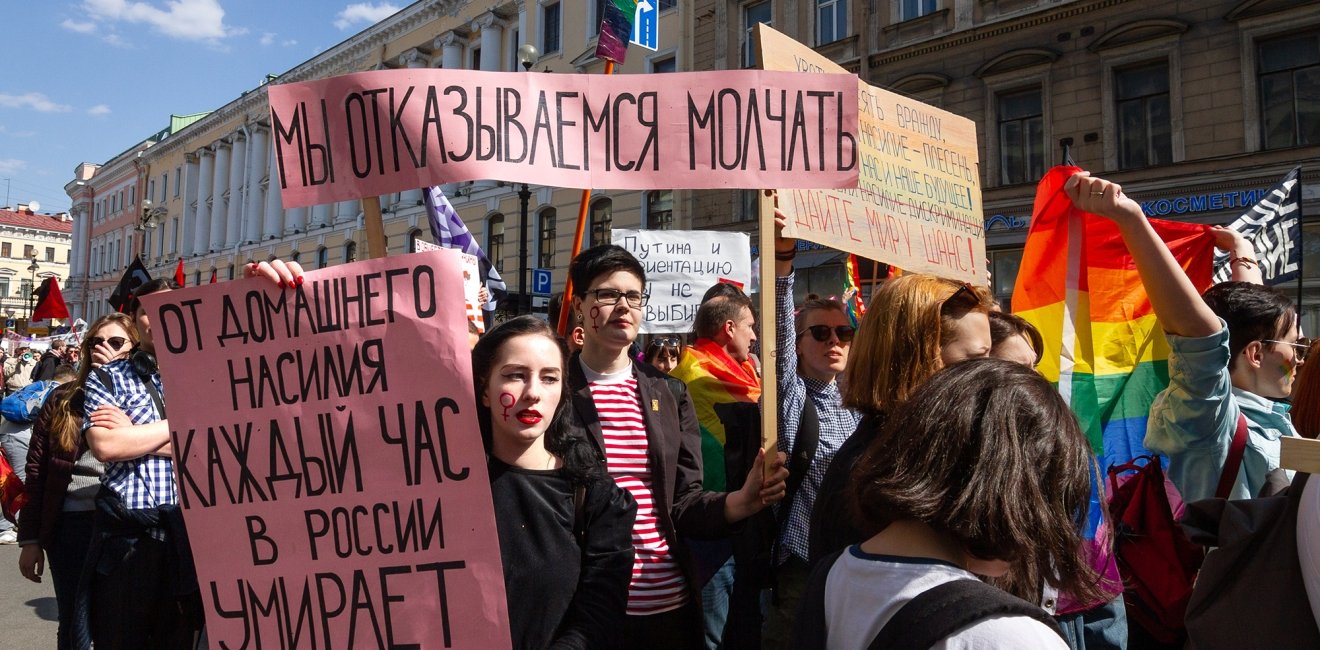
A blog of the Kennan Institute
BY OLIMPIADA USANOVA
One out of three women in the world experience physical or sexual violence in their lifetime, according to the World Health Organization. During times of crisis—such as natural disasters and wars—the risk of gender-based violence escalates. A pandemic is always dangerous that way. As COVID-19 continues to creep across the globe and governments respond with social control measures, victims of domestic violence, most often women, face a double threat: a deadly virus outside and an abuser at home.
The first signs of a jump in domestic violence have already appeared in Russia, following the experience from other countries in lockdown that this situation increasingly calls for heightened attention.
In China, where the coronavirus began to spread earlier this year, organizations that work to protect women from intimate partner violence reported a jump in cases. Many attributed the spike to the virus and the country’s strictly enforced lockdown. “The epidemic has had a huge impact on domestic violence,” says Wan Fei, founder of an anti-domestic-violence nonprofit organization in China. “According to our statistics, 90 percent of the cases of violence are related to the COVID-19 epidemic.” Domestic violence is a widespread problem in China, as it is in many countries. According to a November 2016 survey by the All-China Women's Federation, 30 percent of married Chinese women had experienced some form of domestic violence.
Today’s lockdowns have brought dramatic increases in domestic violence incidents as reported across the globe, including in Brazil, Cyprus, Italy, Spain, France. In Australia, Google has registered the most searches for domestic violence help in the past five years, with a 75 percent increase during the outbreak. In the United States, the National Domestic Violence Hotline, a federally funded NGO, said that the number of calls it gets on a daily basis has reached nearly 2,000, much higher than usual.
How Countries Try to Save Their Women
We will see the real number of victims and death of domestic violence only after the pandemic has subsided. Many victims of domestic violence have refused to seek medical treatment for fear of contracting COVID-19 at a hospital or a shelter. That is why the UN Special Rapporteur on violence against women, Dubravka Simonovic, warned: “The risk is aggravated in a time when there are no or fewer shelters and help services available for victims; when it is difficult to access those that are still open; and when there is less community support; fewer police interventions and less access to justice as many courts are closed.” She said many countries had made significant strides in addressing the COVID-19 threat, but should not leave behind women, children, and other victims of domestic violence, as this could lead to increased incidents of domestic violence, including intimate partner femicides.
Many countries are already taking measures to combat the increase in the incidents of domestic violence. Greenland’s government has banned the sale of alcohol in the territory’s capital following a surge in reports of violence in homes. In France, the government has set up centers in grocery stores where victims can seek help, using secret passwords, in one of the few places they still are allowed to visit. Paris also allocated an extra one million euros ($1.1 million) to help anti-abuse organizations respond to the increased demand for their services. Germany and France have transformed empty hotels and guest houses into shelters. German and French governments have also lifted restrictions, allowing victims of abuse to leave home. The Australian government has promised to spend $1 billion on health and family violence services. On March 31, a group of US senators from nearly twenty states sent a letter to the Department of Health and Human Services asking the Trump administration to provide additional financial support in response to the increased demand for domestic violence services. The UK has announced special police powers to evict perpetrators from homes for the duration of the lockdown, and authorities may waive court fees for protection orders. India has launched a new Domestic Violence Helpline. Greece is stepping up a campaign to help women deal with problems clearly emerging from the issue of confinement.
All of these measures should help reduce the number of victims and number of deaths among women who have been locked down with an abusive partner.
Is Russia Going to Protect Its Women?
Despite its relatively low coronavirus infection rate, Russia is not immune to the lockdown’s negative impact; it is experiencing a jump in domestic violence cases right now. The number of calls to the Domestic Violence Hotline has increased on 25 percent and shelters will soon be overcrowded, Moscow’s ANNA Center recently reported.
Russia has no law to protect women from domestic violence. Russia’s government claims it has no problems with domestic violence, even though one in ten women killed in the world is a Russian woman. The situation in the country is aggravated by the fact that the police have now suspended receiving citizens in person. Simultaneously, Russian citizens received a stay-at-home order without an exception being made for victims to leave home to ask for help. In Russia, women are a majority, 79 million. Still, Russia only has 150 centers that provide protection for women. Because of the COVID pandemic, all of them are closed.
The last plea for help came from nine Russian NGOs, which wrote a letter to the government asking the Putin administration to provide an adequate response to the increased need for domestic violence services. The letter was left unanswered.
In Russian law, domestic violence does not appear as a specific crime; there are no official records on the number of women murdered by their partners. Thus, in the war with the coronavirus in Russia, more women may die at the hands of an intimate partner than from COVID-19 infection.
The opinions expressed in this article are those solely of the author and do not reflect the views of the Kennan Institute.
Author

PhD of Law, Independent Scholar and Lawyer

Kennan Institute
The Kennan Institute is the premier US center for advanced research on Eurasia and the oldest and largest regional program at the Woodrow Wilson International Center for Scholars. The Kennan Institute is committed to improving American understanding of Russia, Ukraine, Central Asia, the South Caucasus, and the surrounding region though research and exchange. Read more

Explore More in The Russia File
Browse The Russia File
In Search of Russia’s Digital Trace in Romania’s Political Crisis

With Syria’s Collapse Russia’s Regional Power Play Disintegrates

Putin's Strategy Tests Europe's Defense Limits

